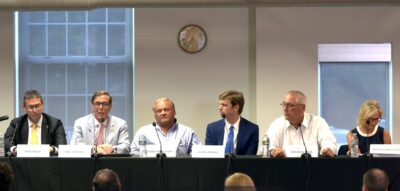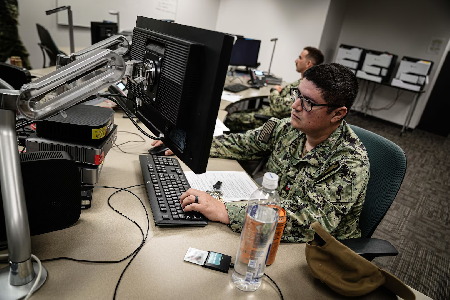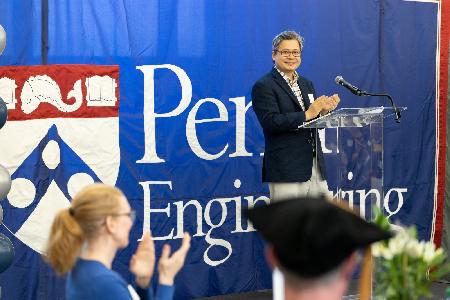The Technology Learning Collaborative (TLC) tackled how local, state and federal government bodies are preparing for an influx of dedicated funding at its annual conference, held this Thursday after a two- year pandemic hiatus.
Its opening panel, moderated by TLC Executive Director Kate Rivera, focused on different approaches to digital equity and access issues. The panel featured Nicole Ugarte, federal program officer of the Pennsylvania Internet For All program at the National Telecommunications and Information Administration (NTIA); Juliet Fink-Yates, digital inclusion manager for the Office of Innovation and Technology within the City of Philadelphia; and Erin Wachter, deputy director of the Pennsylvania Broadband Development Authority.
“The reason why we invited these three people to speak today is to really paint a picture for you of the ways in which government at all levels is investing in digital equity work,” Rivera said while introducing the panel.
Here are five takeaways from their discussion:
1. Federal funding is still a year or two away, but there are actions you can take in the meantime to prepare.
There are several federal funds from which Pennsylvania can receive money for digital equity work, including the $2.7 billion Digital Equity Program and the $42.5 billion Broadband Equity Access and Deployment (BEAD) Program. Both are the result of 2021’s Infrastructure Investment and Jobs Act.
The NTIA works with states to disperse funding from those programs, and each state must form a plan for how they will use the money. However, Pennsylvania is still in the early stages of this process, so it will be a while before there are any applications or deadlines to access that funding.
Ugarte said relevant organizations should share with the NTIA the data they have about digital access to inform how grants are dispersed. The forthcoming federal funding presents an opportunity to think creatively about solutions to longstanding access challenges — like connecting the estimated hundreds of thousands of Pennsylvanians still lacking broadband.
“The idea is that we have the time and, god willing, have the money to really find innovative solutions to tackle the hard problems,” she said. “So help us identify the hard problems and give us your ideas on how those should be addressed.”
At the local level, Fink-Yates said it is important for people who are working directly with Philly residents to inform the local government about anyone they know who can’t get internet access at their homes.
“We are very reliant on the community-based organizations who work with folks to say, ‘I’ve tried to get them access.’ It’s not a bill issue. … It’s that [internet companies] say they can’t serve that area for some reason,” Fink-Yates said. “That shows that Philadelphia isn’t ‘served’ in the way that we think it is.”
She added that one small organization is less likely to get funding on its own, but if that org partners with others in the city and they apply for funding together, they are more likely to get the money they need.
How can folks prepare for the federal funding that’s coming in the next few years?
“Really think about who your partners can be. Make sure we know the work that you’re doing in the city,” said Juliet Fink-Yates @PhiladelphiaGov
— Technical.ly (@Technical_ly) October 6, 2022
2. Device sustainability and distribution is an ongoing effort.
Fink-Yates said it takes a lot of money to get digital devices to all the Philadelphians who need them.
“What I think fundamentally is probably needed is an ongoing fund for devices that enables us to get that money out,” she said. “And that is something that likely we will all need to advocate at that federal level for, those funding streams.”
It’s inevitable that devices will be lost, broken or outdated. Thus, she thinks it’s important to build in a tech support component to digital equity plans to mitigate issues with devices.
Ugarte admitted she didn’t have a good answer for how to fund device sustainability, but said she plans to raise this issue with the NTIA to start thinking about funding such programs.
3. Look at all the systems at play when considering who is responsible for digital access and sustainability.
An audience member asked what it looks like for other non-government organizations to share the responsibility of closing the digital divide.
Ugarte said the NTIA is having conversations about how people can apply for college or a new job without first having a device and the skills to use it. She said a fund already exists to support universities in Pennsylvania to make sure the school has internet and devices available to its students, but there is much more to be done.
Fink-Yates said the government needs corporate partnerships, but they must be sustainable as well. She gave an example of digital equity in healthcare: Patients first need access to a portal to view their profiles and glean information about their health.
“Could an entity like Medicaid cover the cost of a device or the cost of internet, because it is necessary for that patient as part of its access to healthcare?” Fink-Yates said. “And it is about their access to healthcare in the same way they might cover a heart device, right? It’s as essential as that, right? If you think about it that way, what are the systems of payers that we can think about who could leverage a sustainable model down the road for folks?”
4. Accountability looks different at each level of government.
Fink-Yates said accountability to her means that community members and organizations are pointing out what the government is missing so they see their voices reflected in government work.
Wachter said at the state level, accountability means ensuring that every dollar the Pennsylvania Broadband Development Authority receives is used the best way it can be.
“While it is a large amount of money, it’s not limitless,” she said. “We need to be very good stewards of those dollars and ensure that our grant recipients are held accountable and that we are tracking progress and being able to demonstrate progress using those dollars.” (Look for more reporting from Technical.ly on the Authority’s plans soon.)
What does accountability look like at the different government levels?
“It's really ensuring that we are making the best and highest use of every single dollar received. … It’s not limitless. We need to be very good stewards of those dollars,” said Erin Wachter
— Technical.ly (@Technical_ly) October 6, 2022
Ugarte said accountability is literally laid out for her at the government level: It’s required that public meetings are accessible and the outcomes are reported. But she also wants to be engaged in conversations with the people of Pennsylvania.
5. Philly is a unique place for digital equity work.
Fink-Yates said there is a lot going on in Philadelphia, and there are gaps, but this city has people and organizations that really know how to do this work: “It’s really about lifting you all up to do it,” she said to the audience.
Ugarte specifically highlighted the digital navigators program, saying it is impressive that Philadelphians can get one-on-one assistance when they need it.
“I think it’s incredible that Philadelphia has so much data about folks who need access, the programs that they’re able to use and I think that the network of folks working to solve these challenges are truly impressive,” the federal rep said.
Wachter, too, said she just loves the digital navigators program. Read more about how that navigation works in practice.
Sarah Huffman is a 2022-2024 corps member for Report for America, an initiative of The Groundtruth Project that pairs young journalists with local newsrooms. This position is supported by the Lenfest Institute for Journalism.What’s one unique thing about Philly’s digital equity work?
“I think it’s incredible that Philadelphia has so much data about folks who need access. And I think that the network of folks working to solve these challenges are truly impressive,” said Nicole Ugarte from @NTIAgov
— Technical.ly (@Technical_ly) October 6, 2022

This editorial article is a part of Tech + Government Month 2022 of Technical.ly's editorial calendar. This month’s theme is underwritten by Spotify. This story was independently reported and not reviewed by Spotify before publication.
Before you go...
Please consider supporting Technical.ly to keep our independent journalism strong. Unlike most business-focused media outlets, we don’t have a paywall. Instead, we count on your personal and organizational support.
3 ways to support our work:- Contribute to the Journalism Fund. Charitable giving ensures our information remains free and accessible for residents to discover workforce programs and entrepreneurship pathways. This includes philanthropic grants and individual tax-deductible donations from readers like you.
- Use our Preferred Partners. Our directory of vetted providers offers high-quality recommendations for services our readers need, and each referral supports our journalism.
- Use our services. If you need entrepreneurs and tech leaders to buy your services, are seeking technologists to hire or want more professionals to know about your ecosystem, Technical.ly has the biggest and most engaged audience in the mid-Atlantic. We help companies tell their stories and answer big questions to meet and serve our community.
Join our growing Slack community
Join 5,000 tech professionals and entrepreneurs in our community Slack today!

A new model for thinking about how to grow regional economies: the Innovation Ecosystem Stack

Delaware’s next governor will be an entrepreneur. Here’s why Matt Meyer thinks it matters.

Can the nation’s biggest cyber hub even handle Craiglist founder’s $100M security pledge?



